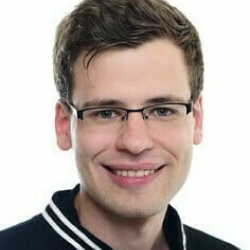Christian Berger (University of Passau)
 received the BSc and MSc degrees in computer science from the University of Passau, Germany, in 2014 and
2017, respectively. In 2018, he started working as a research associate and PhD candidate at the assistant
professorship of security in information systems. His research interests include Byzantine fault tolerance,
resilient distributed systems as well as blockchain and distributed ledger
technology.
received the BSc and MSc degrees in computer science from the University of Passau, Germany, in 2014 and
2017, respectively. In 2018, he started working as a research associate and PhD candidate at the assistant
professorship of security in information systems. His research interests include Byzantine fault tolerance,
resilient distributed systems as well as blockchain and distributed ledger
technology.
 received the BSc and MSc degrees in computer science from the University of Passau, Germany, in 2014 and
2017, respectively. In 2018, he started working as a research associate and PhD candidate at the assistant
professorship of security in information systems. His research interests include Byzantine fault tolerance,
resilient distributed systems as well as blockchain and distributed ledger
technology.
received the BSc and MSc degrees in computer science from the University of Passau, Germany, in 2014 and
2017, respectively. In 2018, he started working as a research associate and PhD candidate at the assistant
professorship of security in information systems. His research interests include Byzantine fault tolerance,
resilient distributed systems as well as blockchain and distributed ledger
technology.
Kai Bleeke (Technische
Universität Braunschweig)
 completed his MSc in computer science at TU Braunschweig in 2021. He now works as a research associate and PhD candidate at the Distributed Systems Group under Prof. Rüdiger Kapitza. His research interests include Byzatine fault tolerance and consensus algorithms.
completed his MSc in computer science at TU Braunschweig in 2021. He now works as a research associate and PhD candidate at the Distributed Systems Group under Prof. Rüdiger Kapitza. His research interests include Byzatine fault tolerance and consensus algorithms.
Signe Rüsch (Technische
Universität Braunschweig)
 received her BSc and MSc degrees in computer science from TU Braunschweig in 2014 and 2017, respectively, after which she started working as a research associate and PhD candidate at the Distributed Systems Group under Prof. Rüdiger Kapitza. Her research interests involve Byzantine fault tolerance, distributed ledger technologies, and trusted execution environments.
received her BSc and MSc degrees in computer science from TU Braunschweig in 2014 and 2017, respectively, after which she started working as a research associate and PhD candidate at the Distributed Systems Group under Prof. Rüdiger Kapitza. Her research interests involve Byzantine fault tolerance, distributed ledger technologies, and trusted execution environments.
